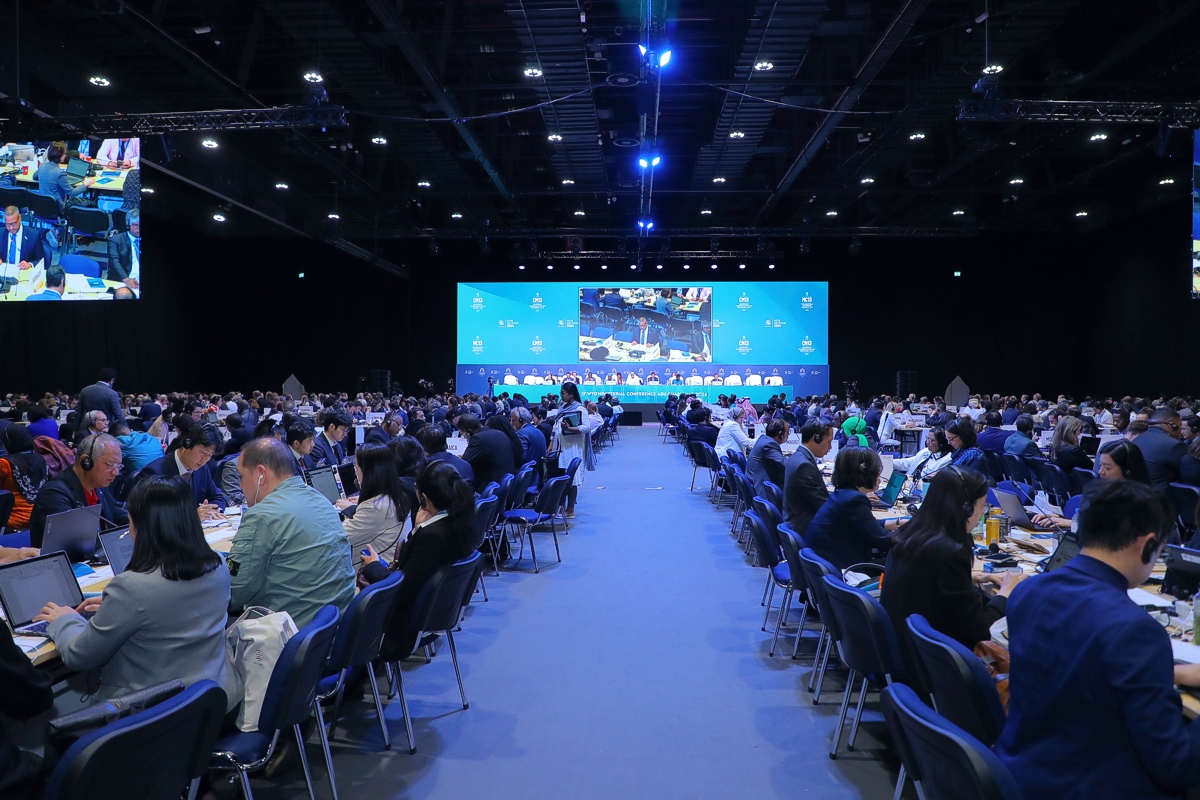SEE ALSO
Scoring the results in the WTO director-general’s ‘half-full’ glass
BEFORE THE MINISTERIAL CONFERENCE
Overview: Cynics circle as another conference heads for small pickings
The issues: Definitely. Maybe. Unlikely. Who knows? Issues on the agenda
By Peter Ungphakorn and Robert Wolfe
POSTED MARCH 13, 2024 | UPDATED MARCH 20, 2024
We’ve deliberately taken our time. The World Trade Organization’s 2024 Ministerial Conference in Abu Dhabi ended almost two weeks ago, after deadlock forced it to be extended by over a day, into the early hours of March 2.
Before the conference we had warned against expecting too much. We had argued that what was going to be essential was to preserve the system. Most issues were not ripe, and the geopolitical situation meant political energy was elsewhere.
Not to cause any harm seemed to be enough to say “job done”.
Some have criticised us for being too complacent, for being satisfied with the status quo. Far from it. We were simply recognising reality.
Quite a lot has been written and said about the conference, its minor successes and the major failures to meet expectations. Here are some talking points that stand out for us. It’s time to look ahead.
CONTINUE READING or JUMP TO
Some of these are long, so use the links
1. We were broadly right but there’s still a sour taste left
2. The system is still in jeopardy
3. Something needs to be done about plurilaterals
4. Future Ministerial Conferences should be organised better
5. Some people misbehaved, others were missing in action
6. Time to think carefully (again) about what Ministerial Conferences are for
7. There’s nothing to stop members talking about issues that weren’t in the declaration
Further reading: Other assessments | On controversial India
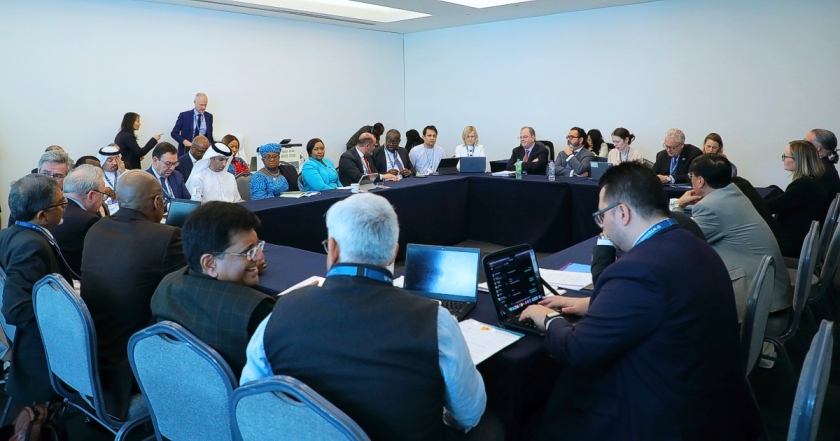
1
We were broadly right but there’s still a sour taste left
The successes (never in doubt) were accepting Comoros and Timor Leste as new members — they will join 30 days after ratification. Perhaps extending the agreement to keep cross-border electronic transmissions duty-free (the “e-commerce moratorium”) was also a success because it was in the balance — but that has been the case at every Ministerial Conference so far.
Those we saw as “maybe”, “unlikely”, “definitely not” and “who knows?” all sank: fisheries subsidies, some aspects of WTO reform, agriculture, services (never on the cards anyway), and annexing investment facilitation as an official WTO plurilateral agreement (ie, involving only part of the membership).
Fisheries subsidies … was the one big issue that had this Ministerial Conference as its deadline
The failure to agree on the present phase of the fisheries subsidies negotiations was particularly disappointing even if it was not unexpected. This was the one big issue that had this Ministerial Conference as its deadline.
Another disappointment was agriculture, where even less was agreed than at the 2022 Ministerial Conference in Geneva — and what was on the table was little more than postponing most decisions until the next Ministerial Conference. The WTO Secretariat’s Agriculture Division’s latest newsletter gives a brief account of what happened, including the February 29 revised draft.
A few issues passed but only in the form of nice words in the ministerial declaration or by ministers acknowledging work done, for example “reform by doing” to streamline how transparency and review works in WTO committees.
Among the nice words, a few details matter, such as the decision to help least-developed countries ease into new disciplines as they graduate into being regular developing countries. Or the decision on improving work on product standards and related regulations.
They may not hit the headlines, but they are important.
One issue that has been in the headlines is dispute settlement reform. It was never going to be agreed at this ministerial, and it wasn’t.
And just as “reform by doing” can continue without a ministerial decision, so can work on all the areas where ministers made no decision. That’s what the delegations in Geneva will continue to do.
One thing we weren’t expecting: how bad the atmosphere was in Abu Dhabi, at least some of the time. More below.
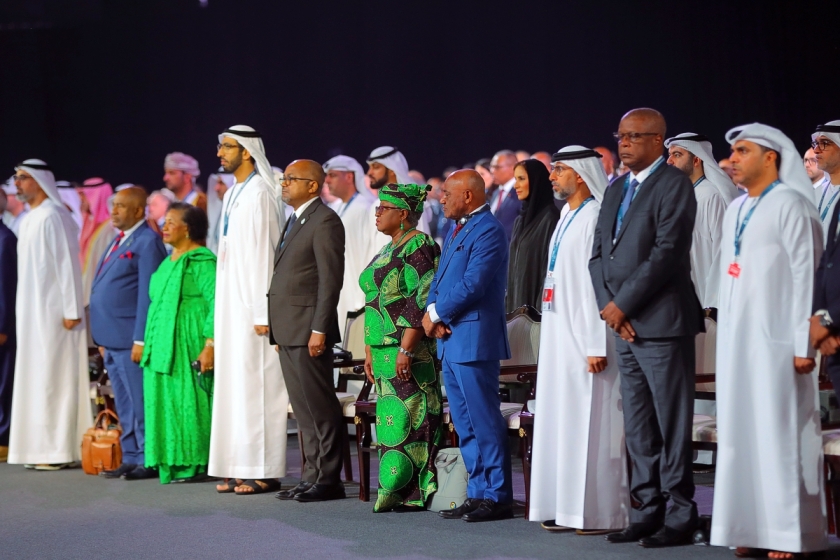
2
The system is still in jeopardy
Preserving the system also requires a forward-looking agenda, difficult as that may be when almost half the world has elections this year.
Some members had proposed setting up a temporary working party to organise regular discussions on trade and industrial policy — coded language for subsidies. There is no hint of this in any of the ministerial documents.
India is reported to have blocked it. Some insiders suggest various groups of developing countries are starting to disagree with India on this.
Preserving the system will be harder if one of the biggest issues facing global trade cannot even be discussed in the WTO.
Massive amounts of money are being splashed out by governments, including through state-owned enterprises, and not just in China or the US. That money affects trade and so it should be talked about in the WTO, where everybody can participate.
Preserving the system will be harder if one of the biggest issues facing global trade cannot even be discussed in the WTO
Let’s be clear. The point is not to launch a new negotiation.
First, members need to develop a shared understanding of what’s going on, including whether these programmes have harmful effects on other countries and global value chains.
Only then would a sensible conversation be possible about whether current WTO rules are fit for purpose. If they are not, then it would be appropriate to consider a mandate for new negotiations.
The other glaring lack in the declaration is on environmental issues.
The Ministerial Declaration mentions the sustainable development goals, more out of habit than enthusiasm. It does not refer to the various documents tabled by groups of ministers on environmental topics including climate change:
- the Coalition of Trade Ministers on Climate (with a “Menu of Voluntary Actions”)
- another group of developing-country ministers on the Contribution of the Multilateral Trading System to Tackle Environmental Challenges
- the plurilateral Ministerial Statement on Plastic Pollution and Environmentally Sustainable Plastics Trade
- the many documents of the plurilateral Trade and Environmental Sustainability Structured Discussions
And back in Geneva, the Trade and Environment Committee has no mandate to bring coherence to this confusion.
India was bizarrely proud of wrecking any possibility of a new working group under the WTO umbrella. Was it doing the dirty work for other countries, or was it alone?
To claim there is no mandate to discuss environmental issues is ridiculous since it is clearly in the 1994 WTO Agreement and Ministerial Decision on Trade and Environment, and the 2001 Doha declaration.
And if the Ministerial Conference serves any purpose (more below) it is to provide new mandates.
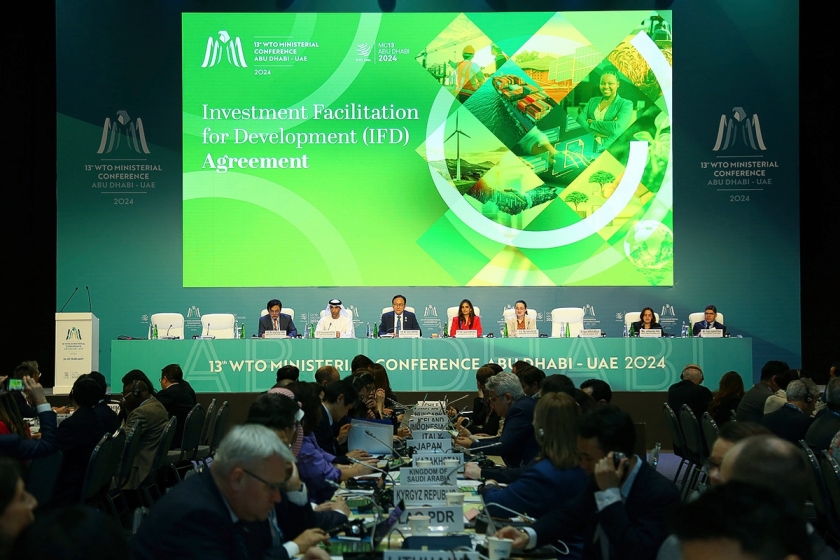
3
Something needs to be done about plurilaterals
This is about reforming WTO negotiations, which are largely blocked, again with implications for the health of the WTO system.
To recap: plurilateral negotiations are among only part of the WTO membership, whereas “multilateral” means all WTO members.
“Part of the membership” can be very large. The Investment Facilitation Agreement has 124 participants, 76% of WTO members, meaning the vast majority are developing countries.
Many inside and outside the WTO believe that plurilaterals are the only way to go when consensus cannot be found to conclude or even to start WTO-wide negotiations.
This part of “WTO reform” would aim to find a way to make negotiations work better. The risk is that opposition to plurilaterals drives new issues out of the WTO.
The challenge … is how to deal with a situation where one member vetoes what the vast majority of members want
For several rule-making plurilateral negotiations, the only way to turn the result into a formal WTO (plurilateral) agreement is to insert it into the WTO rule book (in Annex 4 of the WTO Agreement). And that requires consensus among all WTO members. (See also this from Devon Whittle.)
Before the Ministerial Conference, three countries opposed adding any plurilateral agreement to the package: India, South Africa and Namibia (although Namibia participates in at least one plurilateral activity, on gender equality and women in trade).
Almost no one (with a few exceptions) noticed that in Abu Dhabi even South Africa dropped its opposition to formalising investment facilitation, leaving India on its own.
EU Trade Commissioner Valdis Dombrovskis did mention it:
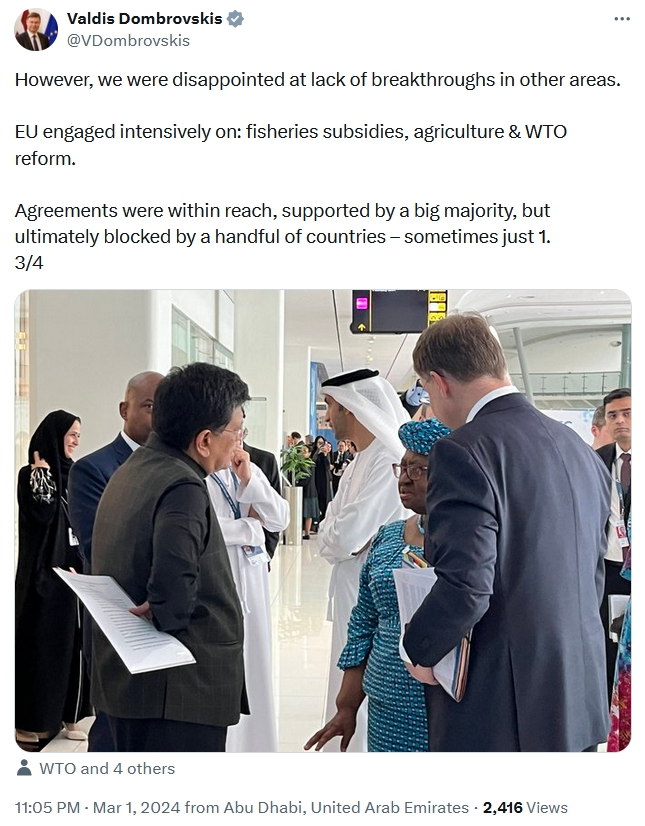
The challenge that WTO members now face is how to deal with a situation where one member vetoes what the vast majority of members want to do. Somehow, a way should be found for plurilateral negotiations to produce new rules within the WTO system.
The Investment Facilitation Agreement has been carefully crafted so it does not affect the rights and obligations of non-participants. The measures that participants apply under the agreement — improved transparency, streamlined procedures, sustainability, and more — would apply to investors from all other WTO members, participants and non-participants alike.
India says even that kind of plurilateral deal is “illegal”. The argument is flimsy, to put it mildly, based on a misguided and selective fixation on “mandates” as if they could never be changed. More below.
A queue is forming behind investment facilitation, with electronic commerce next in line
At some stage members might even want new plurilateral rules that favour participants, as already exists in the WTO Government Procurement Agreement.
A queue is forming behind investment facilitation, with electronic commerce next in line. Finding a way through this deadlock will be crucial.
We can probably rule out changing the rules to allow voting on formalising plurilateral agreements, even if it is legally possible.
If India is going to relax its opposition, the pressure to do so is more likely to come from the increasing number of developing countries who find themselves at odds with India on a range of subjects, including investment facilitation.
There is one possible sliver of hope. India’s Abu Dhabi statement only opposes a decision at the Ministerial Conference. It does not repeat its argument about illegality, and it does not mention any future action.
Some speak of finding ways around the consensus principle. That misses the point.
If one big member consistently blocks decisions, then the organization cannot function. Negotiations among smaller groups are only a partial solution.
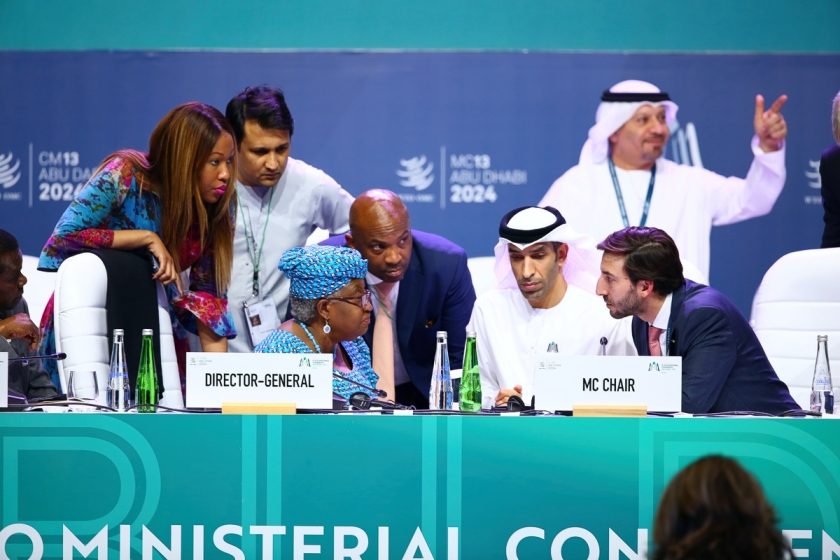
4
Future Ministerial Conferences should be organised better
The facilities in Abu Dhabi were said to be good. The same cannot be said of how the meeting was organised.
A large part of the blame lies with the members. They left their ministers with far too much to decide in Abu Dhabi, so much that even the best-run conference would probably not have succeeded.
Even so, delegates we’ve spoken to talk of confusion and rushing from one meeting to another. Where there is praise is the facilities for ministers to hold their own bilateral talks.
The stress on available time and bandwidth was made worse by the number of proposals that appeared during the conference as well as those from before it, many of them from developing countries. Most of this should have been sorted out before the conference.
The General Council chair’s note accompanying the draft declaration is an indication of how much had been asked and had to be dropped. Much of it would have little future impact even if adopted.
Even so, the signs are that the organisers did not really understand how much work was left and how to set up the conference to give it the best chance of succeeding.
Take, for example, fisheries subsidies. Ministers were given two hours on the second morning presumably to have a complicated text explained to them and to react. They then had a three-hour session, including lunch, for “convergence building”.
And that was it for fish. Next came agriculture, with a similar timetable. (See pages 3 and 4 of this.)
The format was never going to work. Each topic was given a couple of hours in the huge, packed main meeting room
Inevitably fisheries subsidies continued to be discussed in smaller groups. So did agriculture. Some delegates have told us that the process was chaotic. And late in the extended final night, when Fiji and Vanuatu wanted to share the latest version of the fisheries subsidies text with the rest of the membership, India furiously blocked them (more below).
On terminating the e-commerce moratorium, one delegate told us that someone simply read out a key sentence and it was added to the decision without any delegation seeing it in writing before it was gavelled through. (Several sources say the country holding out on extending the moratorium was Indonesia, after India had dropped its objection.)
One activity that seemed like a good idea was for ministers to have “conversations”. Two were organised. One was on “sustainable development”, including industrial policy and subsidies, and policy space. The other was on “inclusiveness”.
The format was never going to work. Each topic was given a couple of hours in the huge, packed main meeting room. With over 100 ministers, the “conversations” consisted of reading out short prepared statements. Nothing more was heard of the conversations afterwards.
The 2009 Ministerial Conference in Geneva consisted entirely of discussion, with no decisions proposed. What was discussed emerged in a chair’s summary and records of proceedings.
In Abu Dhabi? Not a peep.
Exposing ministers to each other’s concerns on unfamiliar topics is a good idea. But it can only be done if they meet in smaller groups where real conversations are possible.
One other reason why time became an issue was because too much effort was spent on glitzy events for the cameras. Substance suffered.

The worst was when the meeting “celebrated” ratifications of the 2022 Fisheries Subsidies Agreement.
In so many ways this was celebrating failure.
The target of 110 ratifications at this conference was missed by a nautical mile — 41 short on the day. That means the 2022 agreement is still a long way away from entering into force, even in the ratifying countries. And the second phase negotiations were in serious trouble.
The positivity did not encourage members to get their act together. It seriously damaged the WTO’s credibility. It was not in any headline. At best it was buried in some news stories. And it took up precious time.
Hopefully Director-General Ngozi Okonjo-Iweala, her team, and the ambassadors in Geneva will think more carefully about managing time and content at the next conference in Cameroon, probably in two years’ time.
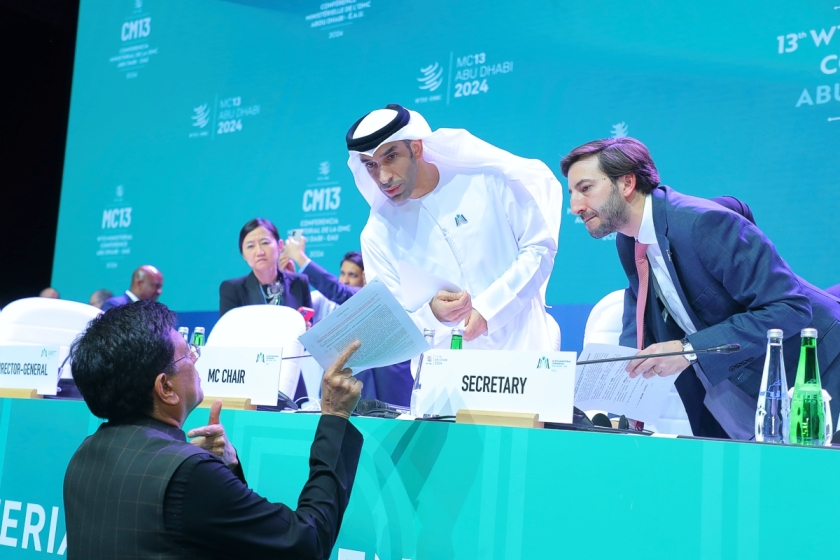
5
Some people misbehaved, others were missing in action
Once again, India dominated the Ministerial Conference, and not in a way that would win many friends except among some voters back home. India isn’t the only member to have been criticized, but it forced itself into the limelight, pushing others into the background.
The US has been let off the hook over dispute settlement reform because the conference was not the real deadline for agreement. But there has been comment about US Trade Representative Katherine Tai leaving as scheduled to attend a fireside chat at Harvard rather than stay for the conference’s extra day. Some criticise the US for not even trying to mediate on deadlocked issues as it sometimes has in the past.
Perhaps Tai and her team felt India had become so belligerent that this time it wasn’t worth it. Or maybe there was nothing they wanted to salvage badly enough. The US also has elections.
The EU Commission had been an important source of ideas but it’s unclear how hard it was pushing for them in Abu Dhabi. Where the EU was reluctant, India’s intransigence may have let it off the hook too. And not just the EU.
In this conference, the criticism of India was not just about its hard line on important topics. India’s Commerce Minister Piyush Goyal’s behaviour surprised many, worst of all in a row said to have erupted after midnight and before the closing session in the early hours of Saturday March 2.
What happened has been reported elsewhere (not totally accurately according to eyewitnesses who spoke to us). Briefly, Goyal was furious when Fiji and Vanuatu wanted to share with the full membership a revised draft on fisheries subsidies that had been developed in talks among a small group of members.
Witnesses were stunned when he appeared physically aggressive with WTO Director-General Okonjo-Iweala and the deputy prime ministers of the two Pacific Island nations. Goyal got his way. The fish text was not shared.
By making itself the focus of negative attention in Abu Dhabi, has India allowed other countries to hide in the shadows, such as China or the US?
Some delegations had already been shocked earlier in the week when India turned criticism from Thailand into a diplomatic incident.
In a session on agriculture Thai Ambassador Pimchanok Pitfield challenged India’s assertion that over-the-limit subsidies used to build up food stocks were necessary for food security. She suggested that the real beneficiaries were Indian rice exporters as their market share soared to 46.4% of world exports.
Before and during the conference, the US, EU, Australia and most members of the Cairns Group, including other developing countries, had made similar arguments. But in Thailand’s case, India complained directly to Bangkok. The ambassador was reportedly recalled. India took it as punishment. The Thai government apologised to Goyal but made no official statement about the recall.
So far, India has positioned itself as a leader of developing countries. To some extent it may still enjoy support in agriculture even though we can question how many of its supporters need the issues it promotes.
But in Abu Dhabi, India was in a minority of three on the e-commerce moratorium (here and here), against 121 WTO members (here and here), about 78 of them developing countries.
It was in a minority of one on adding investment facilitation to the WTO rule-book, against 124 WTO members, most of them developing.
Perhaps it’s no coincidence that the Indian press always calls it “the Chinese-led” investment facilitation agreement. Some Indian commentators saw India’s stand as thwarting China’s agenda at the Ministerial Conference, even though for months the two most active members have been the coordinators, South Korea and Chile.
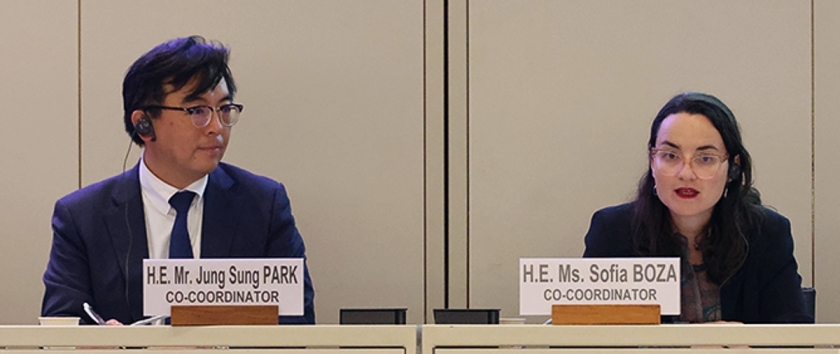
And on fisheries subsidies India had already alienated the Pacific Islands since the 2022 Ministerial Conference.
All of this may win votes back home, but not necessarily support in the WTO where questions are starting to be asked about India’s future role.
Will India continue to receive developing countries’ backing?
And by making itself the focus of negative attention in Abu Dhabi, has India allowed other countries to hide in the shadows, such as China or the US?
On that first question one Indian commentator has already said “yes”.
Asit Ranjan Mishra, Business Standard’s economic affairs editor, wrote (paywalled):
“India has often been the fall guy for assiduously safeguarding development issues at the WTO Ministerials, but it has seen a rapid decline in its coalition partners of developing countries […]
“Indian negotiators believe a key takeaway from [the Abu Dhabi conference] has been that South Africa may no longer be as close a partner to India. The two countries have almost always jointly championed the cause of developing countries. […]
“India was also taken by surprise when South Africa ratified the first part of the fisheries agreement at the closing ceremony of [the conference] without prior communication.”
That last sentence suggests India might be deliberately holding back on ratifying the 2022 Fisheries Subsidies Agreement.
See also “Why always India?”
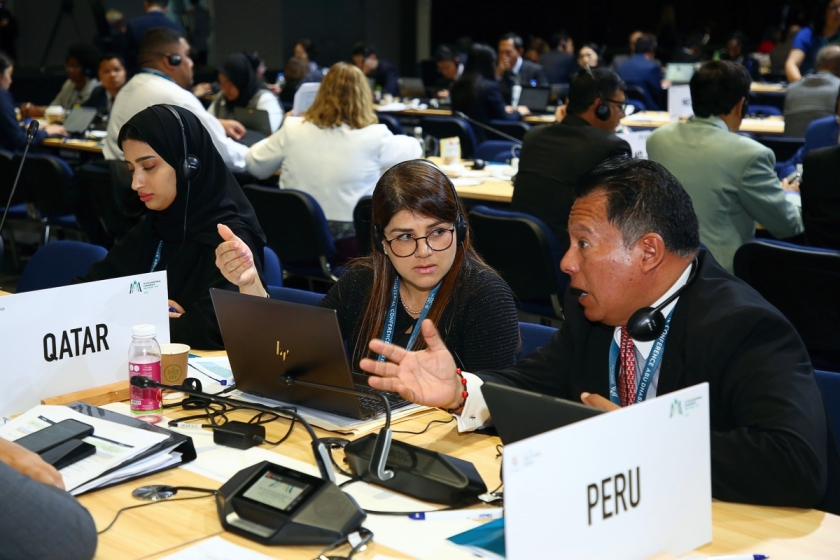
6
Time to think carefully (again) about what Ministerial Conferences are for
Are Ministerial Conferences way stations in an ongoing negotiation?
It was easy to think so when the point of the first few conferences was to launch, advance and conclude a new round of negotiations.
The Doha Round died in 2015 (or was doomed to a state somewhere between life and death). Some grieving family members still don’t accept its demise.
Still, the mindset continued. And so “success” is defined as agreement on a declaration — but they didn’t even get that in Buenos Aires in 2017.
Ministerial Conferences continue to be seen as events unto themselves. Success in 2022 (Geneva) and 2024 (Abu Dhabi) was framed as achieving a set of outcomes. Do we still need to think in this way?
The WTO Agreement says
“There shall be a Ministerial Conference composed of representatives of all the Members, which shall meet at least once every two years. The Ministerial Conference shall carry out the functions of the WTO and take actions necessary to this effect.”
The Agreement lists a great many decisions that should be taken by the Ministerial Conference, but also says
“In the intervals between meetings of the Ministerial Conference, its functions shall be conducted by the General Council.”
So why exactly is it necessary to get ministers together if many of the needed decisions can be taken by ambassadors? Are there decisions that can only be made with the forcing mechanism of a Ministerial Conference?
The General Council is a bus not a comet: it is easy to stall until the next meeting
The General Council is a bus not a comet: it is easy to stall until the next meeting. But when ministers participate, they’re given four or five days, and that’s it. They have a compressed timeframe to reach a decision. Except often they don’t, and life goes on.
Last year a diverse group of members put forward some suggestions on how to improve Ministerial Conferences. They observed:
“Ministers are ultimately responsible for taking political decisions to launch new rule-making projects [and to] endorse negotiations concluded in substance. … In those cases where negotiating gaps have been narrowed considerably by officials, Ministers may, on occasion, be in a position to close negotiations.”
Since negotiations are not the main purpose of the meeting, the bulk of the group’s proposals were intended to enhance “the value to the Membership of regular political input and exchange on issues of shared interest.”
Political understanding must be built at home, but to achieve this, is it essential for ministers to engage personally with the issues and with each other? Does their presence matter for closing the gap between Geneva and the capitals? That gap is a serious problem, as one of us has written elsewhere (paywalled).
We’ve seen that the “conversations” in Abu Dhabi don’t seem to have amounted to much.
Exposing ministers to each other’s concerns on unfamiliar topics is a good idea. Ministers can educate each other, and they can educate the WTO. But it can only be done if they meet in smaller groups where real conversations are possible.
And would ministers come at all if there were no decisions to be made?
More thought should be given to why Ministerial Conferences are even needed. How they should be organized follows on from there.
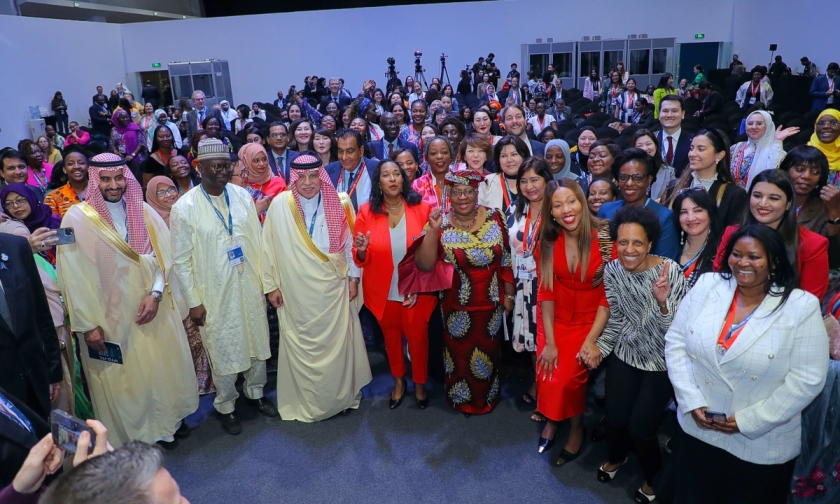
7
There’s nothing to stop members talking about issues that weren’t in the declaration
The General Council has the power take formal decisions on anything, in place of the Ministerial Conference. Will it? Some insiders are pessimistic. The divisions that were seen in Abu Dhabi show little sign of easing in the coming months in Geneva.
Changing the table from the Ministerial Conference to the General Council does not change the political dynamic. Committees and negotiating groups can get on with things. But hostage taking is still possible in the General Council, and packages have to be assembled.
Take the agriculture document sent to ministers. It had been agreed in the agriculture negotiating group — partly because deadlocked questions were left for ministers to answer — then endorsed by the General Council before being forwarded to the ministers. There is nothing to stop the delegates who drafted it from getting down to work. Will they? Only if something changes.
The positional posturing about whether plurilateral negotiations are “legal” is a technical matter that would cause most ministers’ eyes to glaze over. The General Council should deal with issues like that.
There is nothing to stop the delegates who drafted it from getting down to work. Will they?
After all this time there should be no reason why the General Council cannot close the fisheries subsidies negotiations. And if a decision on dispute settlement reform is to be taken in 2024, it will have to be in the General Council. But the omens are not good.
On top of the differences on substance, part of the problem is some countries’ obsession with “mandates”. They cite previous ministerial decisions (sometimes selectively) to justify why some subjects can be discussed in the WTO and why others cannot.
The truth is members can change their minds. They can take new decisions that overturn previous mandates. They can do so in the Ministerial Conference and by extension in the General Council.
Even where there is no formal mandate they can still discuss issues either (multilaterally) among the whole membership or (plurilaterally) part of it, if they want to.
The best we can hope for after Abu Dhabi is that one way or another members can seriously discuss the problems that are mounting up for all of us — industrial subsidies, climate change, pollution, food insecurity. They might be able to keep it going, but they might not have everyone on board.

See also: Other assessments
- Opinion | Everyone would be poorer without the WTO. Biden needs to rescue it. Washington Post Editorial Board, March 3, 2024
- The WTO Ministerial Conference’s qualified success in Abu Dhabi. Alan Wolff, Peterson Institute for International Economics, March 4, 2024
- A weak WTO will damage the planet more than it hurts free trade. Alan Beattie, Financial Times, March 4, 2024. See also Alan’s The case for the WTO. (No, really.), February 26, 2024
- WTO MC13: It’s time for India to move beyond Abu Dhabi and should engage in interest-based negotiations. Pradeep S Mehta, Economic Times (paywalled), March 4. 2024
- Why so much gloom following the World Trade Organization’s latest ministerial conference? Simon Evenett, LinkedIn, March 4, 2024
- Six takeaways from WTO MC13. Keith Rockwell, Hinrich Foundation, March 5, 2024
- Climate and Trade Cooperation After the Thirteenth WTO Ministerial Conference: Quo Vadis? David Kleimann, Jodie Keane, Michai Robertson, Forum on Trade, Environment and the SDGs (TESS), March 7, 2024
- Arid in Abu Dhabi. Asit Ranjan Mishra, Business Standard (India), March 8, 2024
- WTO flops, USA shrugs. Doug Palmer, Politico, March 8, 2024
- When the US fell out of love with Geneva. John Clarke, Hinrich Foundation, March 19, 2024
- WTO reform (36-minute video). Alan Wolff and Victor Do Prado, Friends of Multilateralism Group, March 5, 2024
See also: On controversial India
As reported. Not always correct
- Indian team boycotts Thai representatives at WTO talks Times of India, February 29, 2024
- Thailand recalls its Ambassador to WTO after India’s protest. The Nation (Thailand), March 1, 2024
- Thailand recalls trade envoy after Indian protest. Bangkok Post, March 2, 2024
- Kingdom ‘sorry’ for offensive remarks made to India in UAE. Bangkok Post, March 3, 2024
- After long drama, WTO meet adopts outcome document. Times of India, March 3, 2024
- Key Events at WTO: India’s U-Turn on E-commerce Moratorium, Tense Exchanges Over Fish Subsidies Pact. The Wire (India), March 4, 2024
- India lodged bilateral protest with Thailand before raising issue in WTO. Economic Times (India), March 4, 2024
- Why Thailand’s now-replaced WTO Ambassador questioned India’s agriculture subsidies, what India argued. The Indian Express, March 4, 2024
- A last notebook: Ministerial histrionics, reactions and a final package. Inside US Trade (paywalled) March 5, 2024
See also our previews of the Ministerial Conference “Definitely. Maybe. Unlikely. Who knows? Issues on the WTO conference agenda” and “Cynics circle as another WTO Ministerial Conference heads for small pickings”. And this Friends of Multilateralism Group brainstorming event
Robert Wolfe is Professor Emeritus of Policy Studies, Queen’s University, Kingston, Ontario. He has written extensively on WTO reform issues. Follow him on X/Twitter: @BobWolfeSPS. See all articles he has written on here.
Updates:
March 20, 2024 — adding to the list of “other assessments”
March 14, 2024 — adding the paragraph on agriculture in talking point 1, including links to the Secretariat’s newsletter and revised draft; and the video on WTO reform in the “other assessments” list
Image credits:
Ministerial Conference photos | WTO/Prime Vision
Other photos | WTO



